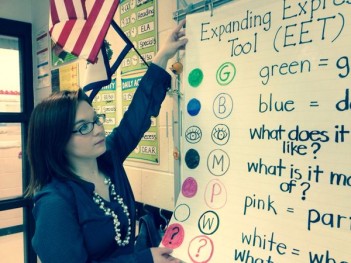
Orchard View Intermediate special education teacher Michelle Devine says she loves her work, but is concerned about proposed legislation that would ease restrictions on alternative teacher certification.
MARTINSBURG, W.Va. — Michelle Devine always knew she wanted to be a school teacher, and her professional dream came true two years ago, when she was hired by Berkeley County Schools to work with special education students.
“I was always the kid who would volunteer to help my teachers and even tutor other students,” she said with a smile, proudly looking around her colorfully decorated classroom at Orchard View Intermediate School.
But she’s now worried about the future for state teachers, especially as legislators consider allowing some alternative certification of teachers, Devine said, after learning that the West Virginia House of Delegates Education Committee on Tuesday passed House Bill 2005.
“Teachers put a lot of time and effort into getting a degree, so that they will be ready to be in a classroom. And that’s what our students deserve,” she said.
“I worry that these new regulations won’t be in the best interest of students and the classroom instruction they receive, while also undermining our teachers,” Devine said.
Critics, including the American Federation of Teachers, maintain this bill will “allow any individual with a bachelor’s degree” to teach in West Virginia’s public schools.
In a press release, AFT-WV President Christine Campbell said the bill “insults the experience and credentials” of certified teachers who have “dedicated their lives” to teaching.
The organization also doesn’t support the idea of using a national program, Teach for America, as an alternative certification program because individuals placed by that program typically teach for only two years, Campbell said.
However, proponents believe the bill – which is now awaiting action in the Senate – will benefit the state since it could help address teacher shortages.
Delegate Stephen Skinner, D-Jefferson, who was the only member of the local delegation to vote against the proposal, said it will only make matters worse – on several levels.
“And it is going to be especially bad for the Eastern Panhandle, where teachers are already having to worry about being part of a reduction in force. So we certainly shouldn’t be looking to bring non-certified teachers in,” Skinner said in telephone interview.
“The best way to address teacher shortages is to pay teachers more, so that additional, high-quality educators will want to work in our state schools. We need to be focused on giving raises to teachers,” he said.
Delegate Larry Faircloth, R-Berkeley, said he had similar misgivings originally but spent time talking to area teachers and trying to get a better understanding of the big picture.
In the end, most of them agreed the bill would not be detrimental to them, but would be a step in the right direction when it comes to getting teachers in districts now plagued by shortages, he said.
“Change is always scary; when I reached out to them, I told them to keep an open mind, because a lot of them were concerned with the fact that they had gone to college specifically for this job and were still only earning about $30,000 a year,” Faircloth said in a telephone interview.
“And now all of a sudden, they thought, someone would be coming in here after only a six-week program and possibly get paid as much or more,” he said.
In the end, they understood the overall intent better and how it would “help add teachers in areas who need them. And also that I would never do anything to jeopardize our teachers or students,” Faircloth said.
Berkeley County Education Association President Wendy Bird said Monday that area teachers are feeling vulnerable at both the state and county levels due to policy changes.
Locally, morale has been negatively impacted by the district’s decision to transfer 74 teachers to different jobs as an attempt to realign the school system and also save money, she said.
They are also concerned about what’s happening in Charleston when it comes to alternative certification standards and upcoming debates over charter schools in the state – an option that she fears would take away funding from the school system.
Bird said Berkeley County superintendent of schools Manny Arvon will be speaking at a Feb. 24 BCEA meeting being held at the Robert C. Byrd Sciences Center auditorium, beginning at 4:15 p.m.
At that time, various educational bills pending in the Legislature, including charter schools, will also be discussed, she said. Followup meetings are scheduled for March 24 and April 28.
– Staff writer Jenni Vincent can be reached at 304-263-8931, ext. 131.





